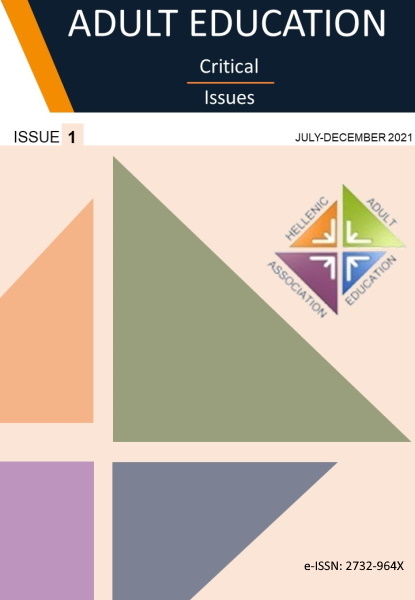Raymond Williams and Antonio Gramsci’s contributions to adult education
Abstract
This time is characterised by the policies and practices of Lifelong Learning. Against this process of dehumanisation, it could be important to ‘revisit’ some authors that enlighten us on how to recuperate an emancipatory adult education, valuable for developing critical thinking about the daily life of individuals and/or communities. In this direction, Raymond Williams and Antonio Gramsci offer us some interesting ideas. Even though they both lived in different countries and in different historic moments, they hold some common points related to a definite view of adult education. I am going to focus on three: the role of the educator, the notion of hegemony and the culture(s). In the conclusions, I will reflect on the contribution of these two thinkers to break the hegemonic view that seems to have reduced adult education to a marginalised niche. Reflecting on their contributions, mostly related to the role of the educator and the notion of culture as the core of adult education, it could be possible to recuperate the emancipatory power of adult education.
Article Details
- Zitationsvorschlag
-
Lucio-Villegas, E. (2021). Raymond Williams and Antonio Gramsci’s contributions to adult education. Adult Education Critical Issues, 1(1), 23–31. https://doi.org/10.12681/aeci.28796
- Ausgabe
- Bd. 1 Nr. 1 (2021): Τεύχος 1
- Rubrik
- Articles

Dieses Werk steht unter der Lizenz Creative Commons Namensnennung 4.0 International.
Authors who publish with this journal agree to the following terms:
- Authors retain copyright and grant the journal right of first publication with the work simultaneously licensed under a Creative Commons Attribution License that allows others to share the work with an acknowledgement of the work's authorship and initial publication in this journal.
- Authors are able to enter into separate, additional contractual arrangements for the non-exclusive distribution of the journal's published version of the work (e.g., post it to an institutional repository or publish it in a book), with an acknowledgement of its initial publication in this journal.
- Authors are permitted and encouraged to post their work online (e.g., in institutional repositories or on their website) prior to and during the submission process, as it can lead to productive exchanges, as well as earlier and greater citation of published work (See The Effect of Open Access).
Downloads
Keine Nutzungsdaten vorhanden.
Literaturhinweise
Borg, C., Buttigieg, J.A., & Mayo, P. (2002). Gramsci and the Unitarian School. Paradoxes and Possibilities. In C. Borg, J.A. Buttigieg & P. Mayo (Eds.) Gramsci and Education. Lanham, MD: Rowman & Littlefield.
Burke, B. (1999, 2005) Antonio Gramsci, schooling and education. The encyclopedia of pedagogy and informal education. [http://www.infed.org/thinkers/et-gram.htm. Retrieved: February 16, 2020].
Coben, D. (1995). Revisiting Gramsci. Studies in the Education of Adults, 27(1), 36–51.
Cole, J. (2008). Raymond Williams and education – a slow reach again for control. The encyclopedia of pedagogy and informal education. [https://infed.org/mobi/raymond-williams-and-education-a-slow-reach-again-for-control/. Retrieved: February 4, 2020]
Dewey, J. ([1916] 1995). Democracia y Educación. Madrid: Morata.
Diaz Salazar, R. (1991). El proyecto de Gramsci. Barcelona: Anthropos.
European Union (2000). Commission Staff working paper. A Memorandum on Lifelong Learning. Brussels, Belgium: European Union. SEC (2000) 1832.
European Union (2007). It is always a good time to learn. Brussels, Belgium: European Union. COM (2007) 558 final.
Freire, P. (1970). Pedagogy of the Oppressed. New York: The Continuum Publishing Company.
Freire, P. (1984). La importancia de leer y el proceso de liberación. Madrid: Siglo XXI.
Gelpi, E. (2004). Trabajo Futuro. La formación como proyecto político. Xàtiva: Edicions del CREC.
Geertz, C. (1987). La intepretación de las culturas. Barcelona: Gedisa
Giroux H. (1990). Los profesores como intelectuales. Hacia una pedagogía critica del aprendizaje. Barcelona: Paidós.
Gramsci, A. (1974a). La formación de los intelectuales. Barcelona: Grijalbo.
Gramsci, A. (1974b). Antología. Madrid: Siglo XXI.
Gramsci, A., & Bordiga, A. (1977). Debate sobre los Consejos de Fábrica. Madrid: Anagrama.
Lima, L.C. (2000). Educação de Adultos e construção da cidadania democrática: Para una crítica do Gerencialismo e da educação contabil. In L.C. Lima (Org.), Educação de Adultos. Forum I (pp. 237-255). Braga: Universidade do Minho.
Lima, L., & Guimarães, P. (2011). European strategies in Lifelong Learning. A critical introduction. Opladen & Farmintong Hills, MI: Barbara Budrich Publishers.
López Luna, J.M. (2011). L'oubli est plein de mémoire. Récupération de la mémoire historique et éducation populaire. In J. González Monteagudo (Ed.), Les histories de vie en Espagne. Entre formation, indentité et memoire. (pp. 253-288). Paris: L’Harmattan.
Lucio-Villegas, E. (2020) Brideshead revisited. Raymond Williams, Antonio Gramsci and an emancipatory adult education. In Proceedings of the Adult Education in Global Times Conference (pp. 431-436). Vancouver, BC: University of British Columbia.
Manacorda, M. (1977). El principio educativo en Gramsci. Salamanca: Sígueme.
Mayo. P. (2010). Antonio Gramsci and his relevance for the Education of Adults. In P. Mayo (Ed.), Gramsci and Educational Thought (pp. 21-37). Chichester: Wiley-Blackwell.
McIlroy, J. (1993). Border Country: Raymond Williams in adult education. In J. McIlroy & S. Westwood (EDS.), Border Country. Raymond Williams in adult education (pp. 269-323). Leicester: NIACE.
Tiana, A. (2021). Las Misiones Pedagógicas. Educación popular en la Segunda República. Madrid: Catarata.
Welton, M. (1982). Gramsci’s contribution to the analysis of public education knowledge. The Journal of Educational Thought, 16 (3), pp. 140-149
Williams, R. ([1961] 1993). An open letter to WEA tutors. In J. McIlroy & S. Westwood (Eds). Border Country. Raymond Williams and adult education. (pp. 222-224). Leicester: NIACE
Williams, R. (1977). Marxism and literature. Oxford: Oxford University Press.
Williams, R. (1984). The Long Revolution. London: Pelican Books.
Williams, R. (1985). Keywords. London: Fontana.



